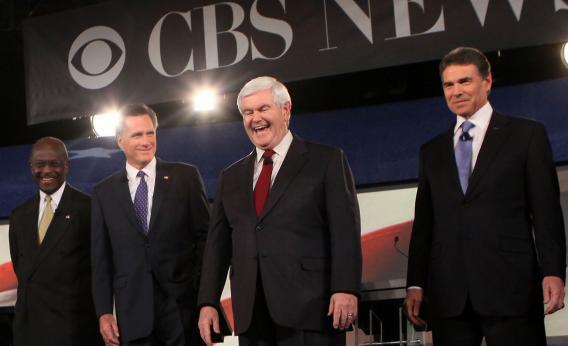Newt Gingrich, who may be on his way to becoming the Republican front-runner, is going to find this piece stupid. Fundamentally stupid, frankly. It might be the biggest abomination since Chamberlain’s appeasement. That’s the way the former speaker sees most things. Talk of tax increases is “maniacally stupid,” he said in Iowa today, where he also called the deficit supercommittee “one of the dumbest things” he’s ever seen in Washington. In the (10 and counting) Republican presidential debates, Gingrich has routinely treated the moderators the way Oliver was treated when he asked for a second bowl of mush.
This is all in character for a man who built his career in part by dismantling opponents of both parties. He didn’t just do battle with Democrats—he dethroned their leader, Jim Wright. Among his own party, Gingrich also criticized those lawmakers he considered too accommodating of the other side, such as then-House Minority Leader Bob Michel. When he was speaker, Gingrich’s treatment of his fellow Republicans led to a failed coup attempt.
But as a presidential candidate, Gingrich has been sweet as pie to his rivals. In Saturday’s debate he was given a chance to attack Mitt Romney and he refused. He was given a second chance and he didn’t take it, calling Romney “a friend who is a great business manager.” He not only has resisted attacking his opponents on the debate stage, he has praised almost all of them. In the Las Vegas debate, denouncing Herman Cain’s 9-9-9 plan seemed to be the ante for participation. But Gingrich stood up for him.
No candidate spans the rheostat more than Gingrich, who can go from sweet to sour in seconds. As the Gingrich candidacy gains traction in the polls, the key questions are going to be about temperament, discipline, and character. Those are important with any candidate—but with Gingrich they are especially so: They are the failings that led to his undoing in the 1990s. (He resigned as speaker, and from the House, in 1999.) We’re all about to relive the ‘90s, and Gingrich’s current temperament will be a counter to unflattering stories of tyrannical behavior from his past.
As he has come up in the polls, Gingrich has rehabilitated his image. In April, according to the Wall Street Journal/NBC News poll, Gingrich’s favorable/unfavorable rating among Republicans was 46 percent to 11 percent. By June it was 28 percent to 33 percent. He was in Sarah Palin territory. But unlike the former Alaska governor, Gingrich has been able to reverse the trend. 61 percent of Republicans have a favorable impression of Gingrich in the new CNN/ORC poll—the highest of any GOP candidate.
The 21st-century Gingrich doesn’t let his opponents off the hook entirely, or course. He just does it off camera. It was a previous knock on Romney that moderators at the last debate were trying to get him to own up to. “Governor Romney is a good manager and if what you want to do is manage Washington,” said Gingrich, “I think he would be a pretty good manager candidate. But if what you want to do is fundamentally, profoundly change Washington, I think that is a different job.”
If Gingrich’s surge proves durable, his story will surpass Richard Nixon’s as the most improbable political comeback in modern American politics. Gingrich left his speakership under an ethics cloud, spitting that his colleagues were “cannibals.” Unlike Nixon, who rehabilitated himself in the wilderness, Gingrich refreshed everyone’s bad feelings at the start of his presidential campaign. He criticized Rep. Paul Ryan’s budget plan. GOP insiders called for him to leave the race to keep from damaging the GOP brand. A voter in Iowa confronted him and sounded just like Gingrich himself, asking: “Why don’t you get out of the [race] before you make a bigger fool of yourself?”
Today Gingrich admitted that at the start he “blew it.” Even when he was in the basement in the polls he has maintained that he would rise again. For a man with an ample sense of self, this might encourage him to return to playing Eye of the Tiger as he enters a room.
Gingrich has benefited from a crumbling Republican field. One Republican strategist in South Carolina explained that Gingrich always had fans, but after his campaign’s catastrophic start they didn’t think he’d go the distance. Now that other candidates have faltered and given people a reason to keep shopping, there’s a bit of a bandwagon as longtime fans come back to him.
Being at the back of the pack allows candidates to be a little looser. Gingrich was almost sparkly in a recent interview with Piers Morgan, joshing with the host and luxuriating in his love of animals. But now Gingrich will face the pressures of being a front-runner, which means reliving that period during the 1990s when his disapproval rating was in the high 70s. He will face a lot of questions about his temperament and discipline, most of which he’ll undoubtedly think are stupid. Whether he says so will tell us something about his temperament this time around.
